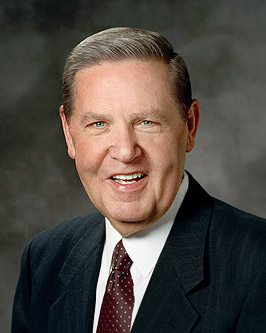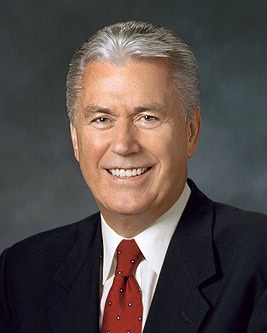Self-Worth
SEARCH BY TITLE
 The Other Prodigal
The Other Prodigal
Among the most memorable parables the Savior ever told is the story of a foolish younger brother who went to his father, asked for his portion of the estate, and left home to squander his inheritance, the scripture says, in “riotous living.” His money and his friends disappeared sooner than he thought possible—they always do—and a day of terrible reckoning came thereafter—it always does. . . But being caught up in this younger son’s story, we can miss, if we are not careful, the account of an elder son, for the opening line of the Savior’s account reads, “A certain man had two sons”—and He might have added, “both of whom were lost and both of whom needed to come home.” The younger son has returned, a robe has been placed on his shoulders and a ring on his finger, when the older son comes on the scene. . . Certainly this younger brother had been a prisoner—a prisoner of sin, stupidity, and a pigsty. But the older brother lives in some confinement, too. He has, as yet, been unable to break out of the prison of himself. He is haunted by the green-eyed monster of jealousy. He feels taken for granted by his father and disenfranchised by his brother, when neither is the case. He has fallen victim to a fictional affront. . . How does this happen, especially when we wish so much that it would not? I think one of the reasons is that every day we see allurements of one kind or another that tell us what we have is not enough. Someone or something is forever telling us we need to be more handsome or more wealthy, more applauded or more admired than we see ourselves as being. We are told we haven’t collected enough possessions or gone to enough fun places. We are bombarded with the message that on the world’s scale of things we have been weighed in the balance and found wanting. Some days it is as if we have been locked in a cubicle of a great and spacious building where the only thing on the TV is a never-ending soap opera entitled Vain Imaginations. But God does not work this way. The father in this story does not tantalize his children. He does not mercilessly measure them against their neighbors. He doesn’t even compare them with each other. His gestures of compassion toward one do not require a withdrawal or denial of love for the other. He is divinely generous to both of these sons. Toward both of his children he extends charity. I believe God is with us the way my precious wife, Pat, is with my singing. She is a gifted musician, something of a musical genius, but I couldn’t capture a musical note with Velcro. And yet I know she loves me in a very special way when I try to sing. I know that because I can see it in her eyes. They are the eyes of love.
 You Are My Hands
You Are My Hands
On one occasion the Savior taught a parable of two men who went into the temple to pray. One man, a respected Pharisee, prayed: “God, I thank thee, that I am not as other men are, extortioners, unjust, adulterers, or even as this publican. I fast twice in the week, I give tithes of all that I possess.” The other man, a hated publican, stood “afar off, [and] would not lift up so much as his eyes unto heaven, but smote upon his breast, saying, God be merciful to me a sinner.” And Jesus said, “I tell you, this man went down to his house justified rather than the other.” In truth, we “all have sinned, and come short of the glory of God.” We are all in need of mercy. In that last day when we are called to the judgment bar of God, do we not hope that our many imperfections will be forgiven? Do we not yearn to feel the Savior’s embrace? It seems only right and proper that we extend to others that which we so earnestly desire for ourselves. I am not suggesting that we accept sin or overlook evil, in our personal life or in the world. Nevertheless, in our zeal, we sometimes confuse sin with sinner, and we condemn too quickly and with too little compassion. We know from modern revelation that “the worth of souls is great in the sight of God.” We cannot gauge the worth of another soul any more than we can measure the span of the universe. Every person we meet is a VIP to our Heavenly Father. Once we understand that, we can begin to understand how we should treat our fellowmen. One woman who had been through years of trial and sorrow said through her tears, “I have come to realize that I am like an old 20-dollar bill—crumpled, torn, dirty, abused, and scarred. But I am still a 20-dollar bill. I am worth something. Even though I may not look like much and even though I have been battered and used, I am still worth the full 20 dollars.”
